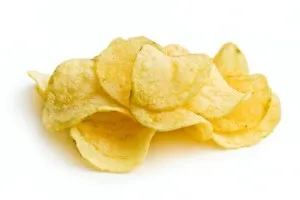If you think that those tasty Pringles stackable chips are made from real potatoes, you need to think again. They are actually a mixture of rice, wheat, corn and potato flakes.
When mixed together with water, this forms a dough-like substance that is rolled into a thin circle, cut into chip cookies by a machine and passed along a conveyor belt into molds, which gives them their fancy stuck-together shape.
After the chips are shaped they are tossed into boiling oil, blown dry, sprayed with artificial flavors and flipped together into a stack. According to health experts, Pringles are quite simply one of the most toxic processed foods you can eat.
Cancer Causing Chemicals
Acrylamide is a cancer-causing and potentially neurotoxic chemical which is created when carbohydrate-rich foods are cooked at high temperatures. Foods cooked above 212 degrees F may contain acrylamide. Potatoes, chips, french fries, toast, processed snacks and roasted breakfast cereals contain some of the highest amounts of this toxic offender.
Potato chips are notoriously high in acrylamides. In 2005, the state of California actually sued potato chip manufacturers because they failed to caution consumers about the high amount of acrylamides.
In 2008, Frito-Lay and other chip manufacturers agreed to reduce the acrylamide levels in their chips to 275 parts per billion, just low enough to avoid them having to put a cancer warning on the package.

A European project known as Heat-Generated Food Toxicants (HEATOX) found that there are over 800 heat-induced compounds, including 53 that are potentially cancer-causing, in industrial and restaurant-prepared foods. Another reason to eat at home!
Chip manufacturers continuing to search to make the “perfectly healthy” chip need to hang it up. They can slap all the natural and healthy labels on packages that they want, but they will not make a processed chip healthy.
How to Avoid Heat-Induced Toxins
The best way to avoid the heat-induced toxins found in processed foods is to eat as much raw or minimally processed foods as possible. Aim for at least one-third of your diet to be raw, and forget foods like french fries, potato chips, sodas and doughnuts that deserve no place in a healthy diet.
If you love the taste of something salty and crispy, why not try spicy kale chips? Made with healthy, fresh ingredients, these chips are dehydrated and contain no dangerous toxins – only life promoting nutrients.
Dehydrated Kale Chips
These chips are a rich source of vitamin B6, vitamin A, vitamin C, vitamin K, riboflavin, copper, potassium, niacin and manganese. The healthy fat in coconut oil, along with the vitamin C in the lime juice, make this a great anti-cancer, anti-heart disease food.
Ingredients
- 1 bunch of fresh organic kale
- 2 tablespoons of organic coconut oil
- 1/4 teaspoon of Himalayan salt
- 1 tablespoon of lime juice
- 1/4 teaspoon of red pepper flakes
Directions
- Rinse the kale under cold water. Dry the kale by shaking over the sink and wipe off any remaining water.
- Pull the kale leaves from the stalk. Shred the leaves into bite-size pieces.
- Place kale pieces in a bowl. In a small bowl mix together the lime juice, salt, oil and pepper flakes. Whisk the ingredients together until they are well mixed.
- Cover the kale chips with the mixture and mix well, until all the kale is coated. Toss gently so as not to bruise the kale.
- Spread the kale on your dehydrator trays. Be sure to leave space between the chips, if they are on top of each other they may not dry well.
- Set your dehydrator temperature at 115 degrees F. This process may take up to ten hours. Check your chips often.
- Store chips in an airtight container out of direct sunlight for up to two weeks.
-The Alternative Daily
Sources:
http://articles.mercola.com/sites/articles/archive/2011/11/07/the-shocking-true-story-of-how-pringles-are-made.aspx
